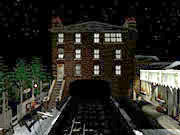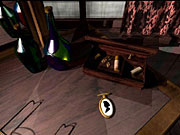A lot of traditional adventure games put you in settings that are oddly, even comically, devoid of characters. Train stations, docks, markets, and museums all seem unrealistically deserted, except for a few conveniently placed characters you're supposed to interact with. It's a bizarre convention that's very much tied to the design of old adventure games--a genre that tends to live in the past, for better or worse. In Dark Fall - The Journal, you won't see any characters at all, but there's a good reason. Dark Fall sends you to a small English town that time seems to have forgotten after the 1940s--a town where the people are missing, but where their ghosts are all too present. Dark Fall breaks no new ground and puts too much emphasis on puzzles, but its meticulously detailed world and paranormal detective story generally keep things entertaining.

Dark Fall opens with a mysterious phone call from your brother, an architect surveying an old train station and an adjoining hotel in the country town of Dowerton. Thanks to an economic downturn and the "unhealthy" interest of the press in some strange disappearances in town, the world has pretty much passed Dowerton by. The train station is closed, and the locals and tourists who didn't vanish suspiciously ended up leaving peacefully. Still, your brother's firm sees some hope for the place in the form of a major renovation and renewal project. You learn from your brother's message that some university students, Nigel and Polly, also have a keen interest in the area. They're armed with high-tech surveillance equipment, and they're hunting for ghosts there.
When you arrive at the old train station to meet your brother, you're immediately hailed by the disembodied voice of a boy, so it's safe to assume these ghosts are more than just the fevered imaginings of some college kids. What's even more disturbing is the fact that your brother is now missing. It's up to you to unravel the mystery of Dowerton, a mystery involving alchemy, astronomy, English history, and plenty of eerie happenings, such as lights blinking out one after another and everyday objects taking on a life of their own.
You'll need to search through each of the hotel's rooms and a bit of the surrounding area to solve the mystery. Unfortunately, you spend almost all your time in the hotel, rummaging through one room after another. The whole process is repetitious, and run-down hotel rooms, haunted or not, just seem too prosaic for an adventure game, as one of the most exciting aspects of the genre is its ability to whisk players away to exotic locales.
In addition, the game puts too much emphasis on puzzle solving, and some of the puzzles, while quite interesting because of their intricate detail and diversity, can be too obscure and perplexing. It's also a shame that the game so often relies on the old adventure-game cliché of telling its story through clues offered by written materials--materials written by and about absent characters. Poring over note after note, journal entry after journal entry, and computer file after computer file can get tiresome in a hurry. Dark Fall is supposed to be a game, after all, not a book.
At least making your way through the world of Dark Fall is pretty easy. You view the world from a first-person perspective and move from one largely static scene to another using a simple point-and-click interface. The cursor changes to an arrow when you can move somewhere, switches to a magnifying glass when you can look more closely at something, and so forth. It's a simple, unobtrusive system that generally works well, though it sometimes requires you to point too precisely. The inventory system is equally straightforward, but while you can pick up certain items, you can't keep the myriad papers and books you find scattered about, so you'll need to make countless notes of your own for future reference.

To find these clues, you'll need to search through a very gloomy world. Whether you're out exploring a dense thicket under the stars or tiptoeing through the hotel's poorly lit rooms, you'll find shadows everywhere. This is more than appropriate, though it can be a bit monotonous. Still, there are usually plenty of interesting and even creepy things to see, like cryptic alchemical symbols scrawled on walls or disturbing images captured by Nigel and Polly's surveillance cameras. A wealth of carefully re-created period detail also helps draw you into the scenes. Quaint architecture, art deco lamps, antique telephones and bathroom fixtures, and authentic old-time railroad posters, like a famous Southern Railway advertisement from 1936, all help set the stage effectively.
Like so many adventure games, Dark Fall's graphics are limited to an antiquated and grainy 640x480 resolution; it would have been nice to have seen the game's well-crafted art in more detail. The game also has the annoying habit of lowering your monitor's refresh rate to headache-inducing levels and then not switching the rate back up when you exit the game, forcing you to reset it by hand each time you quit. The game's audio is actually one of its biggest weaknesses. Ghostly voices and mysterious creaks and moans often sound like low-budget sound effects. As you play, you'll find that they're just as likely to detract from the atmosphere as add to it.
Dark Fall is slow-paced and short, and it lacks the gripping story or exotic locales of the best adventure games. However, adventure-game fans who are patient and love ghost or detective stories will find a challenging mystery in Dark Fall--one that will really put their sleuthing skills to the test.